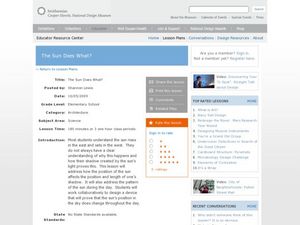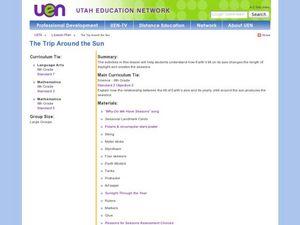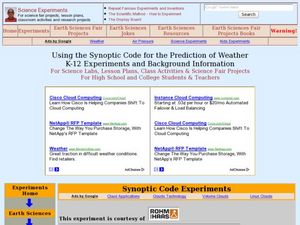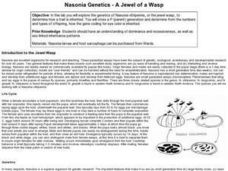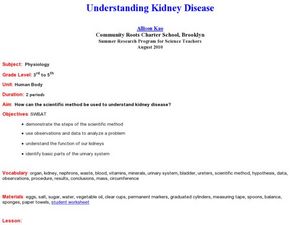Curated OER
The Sky Jeopardy
First graders reinforce concepts about sun, moon, day, night and sky by playing the Sky Jeopardy game. In the end, 1st graders get to nibble crackers in order to show the different phases of the moon.
Curated OER
The Sun Does What?
Students examine why the sun rises in the east and sets in the west. In this sun lesson, students explore the sunset and shadows. Students prove that the sun's position changes during the day. Students investigate what causes a shadow....
Curated OER
The Sun Affects Earth
Third graders read, write, and listen to information about the sun and its effects on the Earth.as it relates to its axis, orbit, rotate, and revolution. In this solar system instructional activity, 3rd graders examine...
Curated OER
Seasons
Students investigate the reason for seasons on Earth during three activities. They construct a model of the Earth and Sun to identify patterns in the changes of the angle of light on the Earth's surface. Then they conduct a heat...
Curated OER
The Trip Around the Sun
Sixth graders investigate the relationship between the tilt of the Earth's axis and the seasons. In this earth science activity, 6th graders sing the song "Why Do We Have Seasons" and use simulate the Earth's tilt by using their bodies.
Curated OER
Solution Shapes
For this solutions worksheet, students soak a pipe cleaner in hot water and a supersaturated solution of 20 Mule Team Borax. Students leave their pipe cleaner in the solution for 30 minutes and then observe. They put it back in over...
Core Knowledge Foundation
Cycles in Nature Tell It Again!™ Read-Aloud Anthology
A read-aloud anthology offers stories all about nature's life cycles. Over three weeks, second graders listen to and discuss tales about the cycles of daytime, nighttime, seasons, plants, trees, frogs, butterflies, and water. Following...
NorthEast Ohio Geoscience Education Outreach
Earth, Sun and You
Middle schoolers model Earth's revolution round the sun by walking a mini-globe around a lamp. You will assess whether or not they tilt and rotate the planet properly and that the revolution is counterclockwise. Discussion beforehand...
Curated OER
Reading Comprehension: Science News
In this reading comprehension worksheet, 3rd graders read four different passages about Science News. They answer questions about each one. Students complete 4 comprehension questions.
Concord Consortium
What Is a Chemical Reaction?
Take your class inside a beaker for an up-close view of a chemical reaction! Junior chemists examine how chemical reactions occur using an interactive resource. The activity allows users to change the temperature and observe how it...
Curated OER
Yesterday, Today and Tomorrow--Measurements of Time
In this measurement of time worksheet, students read a short article and then look at 12 pictures and draw a line from each one to either the sun or the moon. Students distinguish whether each picture is happening in the day or in the...
Curated OER
The Winter Solstice
In this winter solstice worksheet, students read a detailed text about the winter solstice and the historical and religious significance of this day. Students then complete a 15 question fill-in-the-blank and true/false worksheet.
Curated OER
Our Changing View of the Solar System
Students identify and name the eight planets and the five dwarf planets in our solar system. In this space science lesson, students view a slideshow of the planets and label them on an included Solar System chart.
Curated OER
Nocturnal vs. Diurnal Animals
First graders identify nocturnal and diurnal animals. In this animal lesson, 1st graders discuss the differences between animals that are active during the day and those that are active at night. Students write summaries about their...
Marcia's Science Teaching Ideas
Observing the Moon Activity
In this moon worksheet, students observe the moon on three consecutive nights and draw their observations. They answer questions about the phases of the moon and its position in the night sky. They identify the position of the sun, earth...
Curated OER
Who Did It?
Students explore how forensic science is used in criminal investigations. They learn that for the next few days that are going to try to solve a crime that took place in the classroom. Students are given a story to read about the crime...
Curated OER
World In Motion Curriculum
Young scholars explore the night sky and its solar system. Using a Digitarium planetarium system, students observe four constellations. They discover the phases of the moon and eclipses. Young scholars recognize the difference between...
Curated OER
Plant Processes
In this science worksheet, students explore why plants grow in a certain direction by asking a question and using the scientific method to perform the lab.
Curated OER
Sampling Rocks
Students investigate rocks. In this earth science instructional activity, students collect rocks from the schoolyard and describe each of the rocks. Students measure and weigh each rock and record the results. Students create a rock...
Curated OER
Using the Synoptic Code for the Prediction of Water
Learners construct a thermoscreen for the experiment. In this earth science lesson, students make observations and interpret them using synoptic codes. They predict the weather based on gathered information.
Curated OER
Nasonia Genetics-A Jewel of a Wasp
Students investigate the inheritance pattern of eye color in Nasonia wasps. In this genetics and inheritance lesson plan, students read about the life cycle of Nasonia wasps and hypothesize about the possibilities of eye color inherited...
Curated OER
Solar Energy Experiment
Students observe solar energy at work. In this science lesson, students watch two bottles, painted black and white, sit in the heat with balloons on the mouth of the bottles. They observe and discuss why the balloon of the black bottle...
Curated OER
What Do Soils Have to Do With Me?
For this identifying ways we use soils every day worksheet, students investigate their houses, home environment, clothing labels, and foods to see what was made from things grown in soils. Students write 5 short answers.
Curated OER
Understanding Kidney Disease
Students experiment to determine information about kidney function. In this kidney function lesson, students use the scientific method to experiment with eggs, water, salt, sugar, and vegetable oil to simulate kidney function. They...



